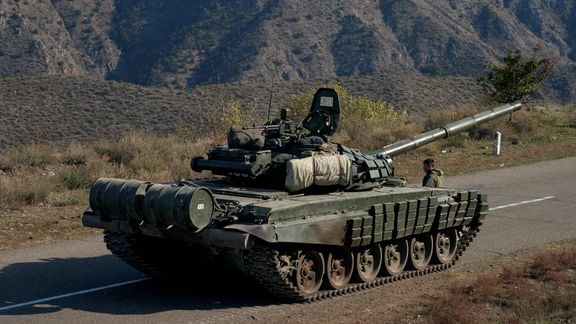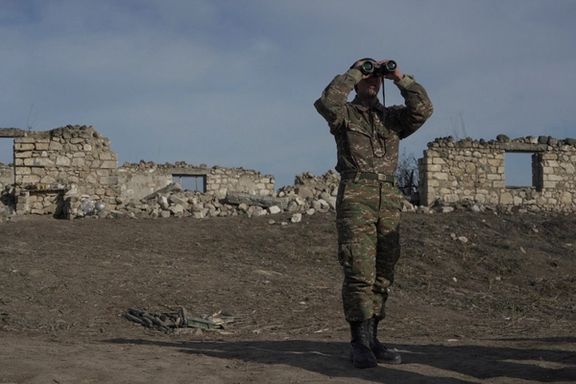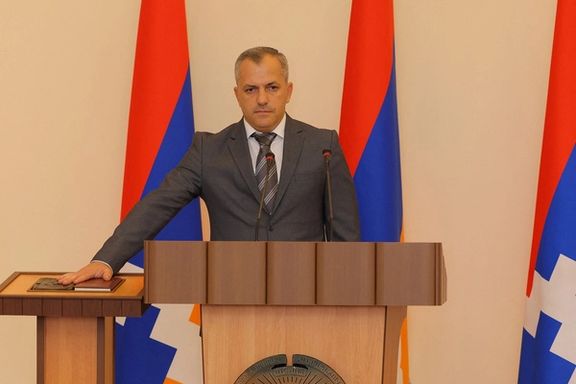Azerbaijan Denies Deal With Armenian Separatists To Open Roads

Azerbaijan has denied that Baku had reached a deal with the breakaway province of Nagorno-Karabakh to simultaneously reopen roads to Azerbaijan and Armenia.

Azerbaijan has denied that Baku had reached a deal with the breakaway province of Nagorno-Karabakh to simultaneously reopen roads to Azerbaijan and Armenia.
Hikmet Hajiev, a foreign policy advisor to Azerbaijani President Ilham Aliyev, said on the platform X, formerly known as Twitter that Baku had offered to simultaneously reopen the roads but that what he called the "illegal regime" in Karabakh had refused.
Earlier reports had said Baku and separatist ethnic Armenians in the disputed region had agreed to reopen two transport routes to the breakaway region, including the key Lachin corridor after weeks of a blockade that put the Armenian enclave in a humanitarian crisis. It was initially reported by Armenia's Armenpress state news agency Saturday and later confirmed by Baku but apparently it did not hold.
The separatist in Karabakh had announced that they would let in aid shipments from Baku-held territory for the first time in decades, and in return Azerbaijan would end blockade of road links to Armenia. It would be the first direct transport link between Azeri government-held territory and the province, which broke free of Baku's rule in the 1990s. It was reported that the move was driven by "severe humanitarian problems" in the blockaded region.
The United States is "deeply concerned about the rapidly deteriorating humanitarian situation" in Azerbaijan's breakaway region of Nagorno-Karabakh, Secretary of State Antony Blinken said on Sunday.

Karabakh is recognized globally as part of Azerbaijan but controlled by its population of around 120,000 ethnic Armenians since the 1993 war that coincided with the breakup of the Soviet Union. Azerbaijan recaptured large swathes of land in a second major war in 2020, and for the past nine months has restricted its access to Armenia through the Lachin corridor.
The road has been cut off apart for urgent medical cases, leading to severe shortages of food, fuel, and medicine as well as rationing of bread. To justify the blockade, Azerbaijan accused Armenia of using the corridor to smuggle weapons, and of rejecting an offer to reopen the road simultaneously with another route into Karabakh.
The cancelled deal was announced on a day Karabakh's parliament chose Samvel Shahramanyan -- a military officer and former head of the territory's security service -- as the new president of its self-proclaimed independent republic.

Azerbaijan, as well as its allies Ukraine and Turkey, condemned the election as illegal, amid days of escalating tensions that saw both Baku and Yerevan building up military forces along the line of contact in Nagorno-Karabakh and the Armenian-Azerbaijan border. The European Union said it did not recognize the election, but that Karabakh residents should "consolidate around the de facto leadership" in talks with Baku.
Azerbaijan said on Saturday that Armenian forces had fired on its troops overnight, and that Azerbaijan army units took "retaliatory measures". Armenia denied the incident. However, during the past several days, footage has emerged of escalated military movements.
Tensions intensified earlier in the month after the Armenian Defense Ministry announced that it will hold a joint war game with NATO forces from September 11-20, dubbed Eagle Partner 2023, aimed at increasing the level of interoperability of units participating in international peacekeeping missions. The joint drill with the United States forces can be construed as Armenia leaning towards the West to secure support in case of a military conflict.
Traditionally, Baku has a close relationship with Turkey while Armenia leaned on Russia and Iran, both against any border changes between the two longtime rivals. However, Yerevan is now seeking wider international support and is distancing itself from Moscow, perhaps because Russia is engrossed in its invasion of Ukraine as well as its warming ties with Turkey and Azerbaijan. Russia sent peacekeepers to the area and promised to keep the Lachin corridor open as part of a peace deal that ended the 2020 war.
Armenia's Prime Minister Nikol Pashinyan recently complained that Moscow failed to live up to its assurances, and that exclusive dependence on Russia does not serve Armenia's security well anymore, a statement that Moscow described as "public rhetoric bordering on rudeness".
On Saturday, Pashinyan held phone conversations with the leaders of France, Germany, Iran and Georgia, and with US Secretary of State Antony Blinken. Azerbaijan also said its foreign minister discussed the situation with a senior US State Department official, Yuri Kim.
Amid simmering tensions, Iranian sources on social media have claimed that Tehran has sent a serious warning to Baku not to launch an attack. A channel close to Iran’s Revolutionary Guards published videos of Iranian armored vehicles in the vicinity of Aras River, which borders Armenia.
Meanwhile, according to unconfirmed reports, Turkish Foreign Minister Hakan Fidan has warned Iran against intervening in Azerbaijan. “If Iran takes action against Azerbaijan, the Turkish Army will be quick to respond,”a telegram channel cited the Turkish diplomat.
Israeli television channel i24 claims that “Iran has been making every effort in recent weeks to fuel revanchist sentiments in Armenia, and acting on it by mediating arms purchases from India and demonstrating military support.” The media outlet cited unnamed Russian sources as saying that “Tehran may, in coordination with Yerevan, introduce its armed forces into the Armenian territory, as it has been one of the channels for the transfer of military equipment to Russia since the beginning of the conflict in Ukraine.”
The Islamic Republic of Iran has previously cautioned against any alterations to the political geography of the Caucasus region and the adjustment of international borders. Iran declared that if either side seeks to change the geopolitical landscape of the Caucasus or international borders in the Karabakh region, Iran will set aside its neutrality and respond directly.